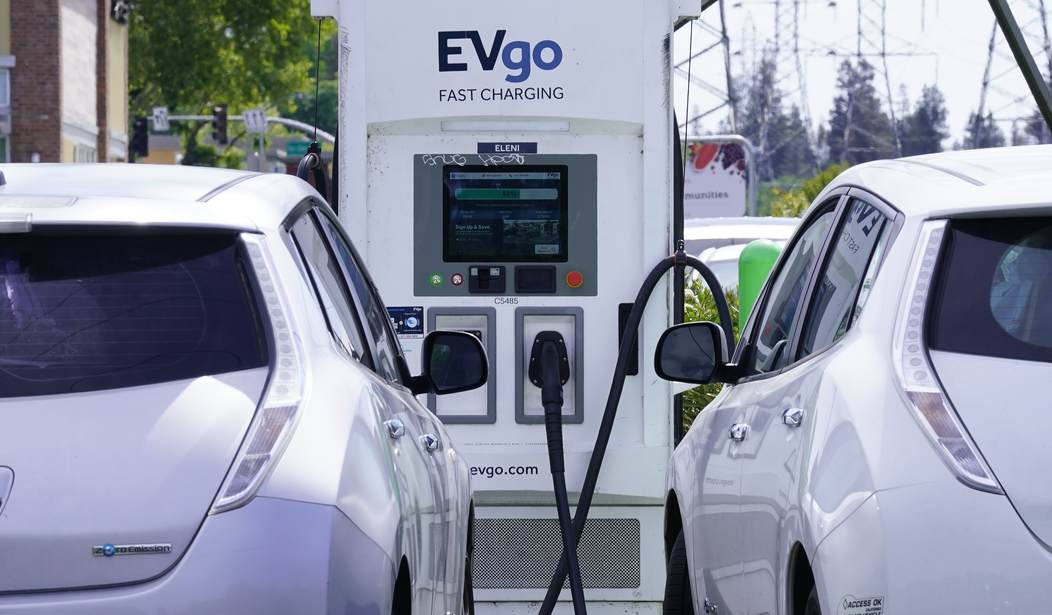Donald Trump's anodyne if overexcited comment that the U.S. auto industry would face a "bloodbath" if he's not elected and doesn't impose 50% or 100% tariffs on cars produced predictable results.
"Don't outsmart yourself," Sen. Brian Schatz (D-Hawaii) posted, and Joe Biden's campaign promptly charged Trump with promising a "bloodbath" if he loses, without saying that he used a common metaphor and was talking about the auto industry.
That's a subject Team Biden is understandably touchy about, given the conspicuous fiasco of its electric vehicle policies.
It's summed up in a lengthy Wall Street Journal report on how a "dramatic societal shift to electric cars" had "overlooked an important constituency: the consumer."
The evidence is plentiful. Manufacturers have been cutting prices as dealers' lots filled up with unsold electrics. Ford is halving its output of electric F-150 trucks in its Dearborn, Michigan, plant. General Motors dealers are pressing the company to reverse its strategy, cut EV production, and build hybrids instead. Tesla CEO Elon Musk warned of "notably lower" EV production.
Expectations elsewhere went unmet. Hertz sold off 20,000 rental EVs at a loss of $245 million and fired its CEO, a Goldman Sachs alumnus. EV startup Fisker, which defaulted on $192 million in Obama administration loans, is reportedly preparing for bankruptcy. Apple is shutting down its multibillion-dollar electric car division.
Recommended
"Plans for an EV-led industrial revolution are in full-scale retreat" in Britain, France, and Germany, the London-based Telegraph reported. "It looks like all those 'well-paid green jobs' are going to take a little longer to arrive than anyone anticipated."
Liberals justify the $7,500 consumer subsidies for EVs as a way to reduce carbon emissions. But, of course, reductions depend on where the electricity, and the rare earths and metals in batteries, come from. Meanwhile, the environmental pitch may have boosted sales among Democrats, but it also has resulted in low sales to Republicans.
These attitudes correlate with geography. EVs may be practical to zip about in the mild weather of the Pacific Coast and over the short distances of the Northeast -- Biden territory in 2020. But EV batteries run out of charge over long distances, when it's freezing outside, or when you've got your air conditioning on -- all common experiences in the South, Midwest and Rocky Mountain states, which Trump carried in 2016 and 2020.
It's not hard to see, although government projections seem to have missed it, that many people would be reluctant to pay more for a vehicle likely to totally stop functioning in common use, and much more expensive to repair.
And irksome to charge. In the 1920s, the private sector built vast networks of gas stations capable of refueling a vehicle in five or 10 minutes. In the 2020s, the government has taken on the task of building electric charging stations, with predictable results. After more than two years, the $5 billion 2021 charging station program has produced exactly eight charging stations.
In the marketplace, it's clear the demand for electric vehicles is much smaller than that predicted by environmental enthusiasts and imposed on carmakers by the Biden administration. Toyota's hybrid gasoline-and-electric vehicles, while less fashionable in certain quarters than battery-powered EVs, are rated as more reliable and just as green, and they are outselling the all-electrics.
As the late economist Herbert Stein said, "If something cannot go on forever, it will stop." Projections for EV sales have fallen woefully short month after month. The Environmental Protection Agency projects EV sales will rise from 7.6% in 2023 to 67% in 2032, but the EPA's tailpipe regulations, the tool used to raise EV sales, are not on track to do so.
At least not without drastically cutting total auto production. Environmental nonprofit organizations may not mind that, but the United Auto Workers, which represents workers at Detroit's Big Three but not at Tesla or foreign-based companies, does and has demanded the administration change policy.
Which it has, sort of. The EPA is now announcing it won't enforce EV sales requirements until 2030. But it still says it's requiring two-thirds by 2032.
As you may have noticed, there are three presidential elections between now and late 2032, when Biden will turn 90 and Trump 86. Team Biden is obviously fiddling with its failed EV policies in the hopes of smoothing over the differences between its environmentalist and union constituencies, Marin County, California, and Macomb County, Michigan. That might work, up through Election Day.
Then, whoever wins, there will come something you might provocatively call a bloodbath. For an industry with large capital needs and long lead times, or for environmentalists determined to phase out vehicles that most consumers prefer and can afford -- maybe for both.

























Join the conversation as a VIP Member